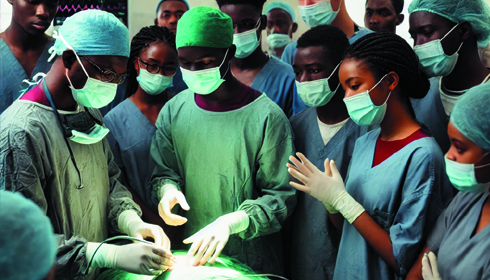
The Unseen Struggle: Challenges Facing Medical Students in Resource-Poor Areas
In a major development, Achanga and fellow reserachers. presented a significant study in Health Science Reports (2025) that provides light on the challenges medical students and early-career doctors encounter in surgical practice in low- and middle-income countries (LMICs). The report examines existing restrictions and proposes viable solutions to close the healthcare gap in these locations.
Surgical care remains a serious concern in resource-limited settings, where inadequate infrastructure, a shortage of medical supplies, and insufficient training opportunities all contribute to poor healthcare quality. According to the study, approximately 5 billion people globally do not have access to safe and cheap surgical treatments, with LMICs bearing a disproportionately large cost.
"In many regions, we are still performing basic surgeries without essential tools and equipment," the paper says, emphasising the discrepancy in surgical treatment.
Medical students and early-career doctors sometimes suffer due to insufficient exposure to surgical patients, a lack of mentorship, and antiquated training approaches. The journal notes that job shifting, in which general practitioners or non-specialists undertake surgery, has grown frequent as a result of a dearth of skilled surgeons. While this gives momentary respite, it is not a long-term answer to improving healthcare systems in low- and middle-income countries.
"Without proper mentorship and infrastructure, even the most motivated medical students cannot achieve their full potential," the researchers say.
To overcome these problems, the study suggests combining many ways to improve surgical training and patient outcomes. Telemedicine and telesurgery emerge as critical techniques that use digital platforms to provide remote surgical education, consultations, and real-time help during surgeries. This technique ensures that medical trainees obtain vital ideas and guidance from experienced surgeons, regardless of location.
In addition to technology developments, task sharing through supervised training is an important step. Encourage competent surgeons to mentor novice doctors and medical students through structured programs that promote hands-on learning and skill gain. By including trainees in surgical teams, knowledge transfer becomes more effective, gradually improving the local surgical workforce.
Equally important is the use of high-impact, low-cost operations, which prioritise cost-effective approaches that maximise healthcare benefits for large populations. Hospitals in low- and middle-income countries can improve surgical results by focusing on critical treatments that address prevalent medical disorders.
Furthermore, international collaboration is critical in enhancing surgical training in resource-limited situations. Partnerships with high-income countries provide access to advanced training, resources, and research possibilities, ultimately improving surgical education and patient care in low- and middle-income countries.
The study emphasises the need for policymakers, healthcare organisations, and educational institutions to invest in improving surgical treatments in low- and middle-income countries. Effective training for medical students and early-career doctors can improve healthcare outcomes and save lives.
"The future of surgery in resource-limited situations is dependent on the choices we make now. The study finds that collaboration and innovation are crucial to addressing these problems.